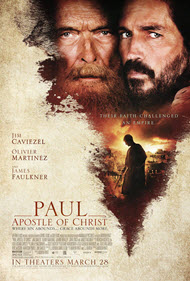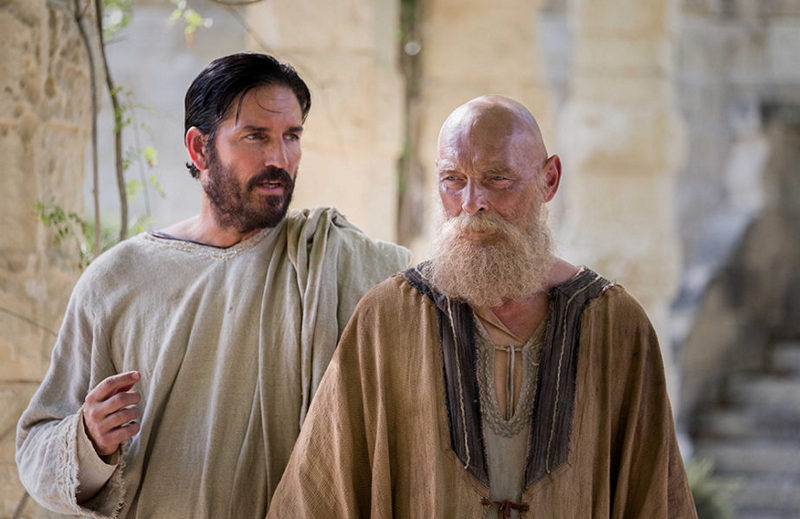Paul, Apostle of Christ
 for some violent content and disturbing images.
for some violent content and disturbing images.
Reviewed by: David Criswell, Ph.D.
CONTRIBUTOR
| Moral Rating: | Average |
| Moviemaking Quality: |
|
| Primary Audience: | Adults Teens |
| Genre: | Christian Drama |
| Length: | 1 hr. 46 min. |
| Year of Release: | 2018 |
| USA Release: |
March 23, 2018 (wide—1,400+ theaters) DVD: June 12, 2018 |




Who is SAUL of Tarsus? Answer
Who is PAUL? Answer
The great importance of genuine HUMILITY and active LOVE
Paul considered himself a willing slave of Jesus Christ
How did Jesus greatly humble himself for us? Answer

Who is LUKE? Answer
What is a disciple and who were the 12 chosen DISCIPLES of Jesus Christ? Answer
What is an APOSTLE? Answer
What is the ACTS OF THE APOSTLES? Answer

What is GRACE? Answer
Salvation by grace alone, not through human effort (a difference between Biblical Christianity and teachings common in the Roman Catholic church) - Go
What is REDEMPTION and who is the REDEEMER?
Who is PRISCIlLA? Answer
Who is AQUILA? Answer
Who is GAMALIEL? Answer

Are you good enough to get to Heaven? Answer
How good is good enough? Answer
Will all mankind eventually be saved? Answer
This film is dedicated to Christians who are suffering persecution in our day. Why and how should we pray for suffering Christians? Answer
Normally, people do not willingly die for things they doubt
| Featuring |
|---|
|
James Faulkner … Paul James Caviezel … Luke Joanne Whalley … Priscilla Olivier Martinez … Mauritius, prefect of Mamertine Prison John Lynch … Aquila Antonia Campbell-Hughes … Irenica Noah Huntley … Publius Alexandra Vino … Octavia Yorgos Karamihos … Saul of Tarsus Alessandro Sperduti … Cassius Manuel Cauchi … Ananias Christopher Dingli … Roman Doctor Joe Azzopardi … Roman Thug Mario Opinato … Balbus Husam Chadat … Gamaliel See all » |
| Director |
|
Andrew Hyatt — “Full of Grace” (2016), a drama about Mary, the mother of Jesus during her last days on Earth He is a Roman Catholic who attended Catholic schools from kindergaren and is an alumnist of Loyola Marymount University. He also wrote the script for both films. |
| Producer |
|
Outside Da Box (OBD Films—a Catholic ministry) Affirm Films, owned by Sony Pictures Entertainment See all » |
| Distributor |
A fictional drama about Paul and the early Church
“Paul, Apostle of Christ” is a new film distributed by Affirm Films. It stars James Caviezel as Luke, who is better known for his role as Jesus Christ in “The Passion of the Christ.”
The story itself is a fictional, weaved around the last days of the Apostle Paul. The structure allows them to tell the story of Paul in a few flashbacks, while following the lives of a few fictional characters and the effect that Paul has on their lives.
As one would expect from a Biblical based film, there are many expectations and criteria which viewers may not have for other films. The most obvious of which is… is it Biblical? Let us begin then with the historical and Biblical issues before addressing the artistic vision of the film.
As an author of Biblical textbooks, I am harder to please than many, but I also understand the sensibilities of film and its restrictions. I appreciate their attempt to weave a story around flashbacks, rather than creating a cumbersome sweeping epic of Paul’s life which would have required a vastly larger budget than this film (allegedly $5,000,000). I am therefore forgiving of some of the minor historical errors. For example, scholars continue to debate whether or not Paul died in 65 A.D. or 67 A.D. (or even 68 A.D.). Of slightly higher importance, but no major significance, is the false assumption that Luke wrote the book of Acts while Paul was in prison awaiting execution, although it is likely Acts was finished in Paul’s first imprisonment around 63 A.D. Nevertheless, such issues are of no real importance to the story.
One issue which deserves mention is the idea of Christians arguing among themselves about whether or not to rebel against Rome, including a scene where some Christians raid the prison, killing guards, in an attempt to rescue Paul, only to find him rebuke their actions. It is natural that the writers should assume that the Christians of Rome were no different than those of today, but the student of Biblical history knows that Rome changed precisely because the early church had a unique view of the world that has perhaps been shared by no generation since. They welcomed martyrdom. Some even sought it out. True, most were doubtless afraid, but there was no hint of armed rebellion by the Christians in antiquity. Even the enemies of Christ acknowledged the passivity of the early Church.
Consequently, the rebellion scene was a little hard for me to swallow, but I cannot fault the authors on this completely, for their purpose was to show Paul’s unwavering belief that Christ is victorious in all things. He does not need our help.
In most other respects, the film was true to history. Christians are shown being used as human torches, persecuted, and martyred. Paul is not exactly as I would have envisioned him, but I saw only one real theological issue which was subtle, but not carried through. In the opening scene of the movie, Paul looks toward heaven and asks, “Is this all there is?” This attempt to portray Paul with doubts may stem from the Catholic roots of the writer/director, or it may simply be a poor attempt to show Paul’s struggles in the midst of persecution and to set the stage for the rest of the film.
Nevertheless, I am happy to say that from that moment on Paul is never shown in this light. On the contrary, he affirms time and time again that “Christ’s grace is sufficient.”
Another possible issue is the subtle notion of Paul being idolized by the early Church. Certainly he was looked up to as one of the Apostles, and there is no hint of worship or deification, but Luke is depicted as wanting to insure that Paul left a legacy in writing, as if Paul needed encouragement to write to his churches. Having noted these two points, I did not see any attempt to read salvation by works or sacraments into the story and thus can support the theology of the film with these small reservations.
So what of the actual film itself? Let me begin by saying that the cinematography and acting was superb. The only hint that this was not a big budget film was the obvious omission of elaborate sets and/or depictions of the circus maximus. The narrative itself was not only about Luke and Paul, but the Roman prefect Mauritius (Olivier Martinez) who is fascinated by Paul and his convictions. The story seems to imply that Mauritius may have converted to Christ, although it is not clear, since he was present at Paul’s execution and issued the formal orders. The film lacks an enthralling narrative that draws the viewer into the story. Some may find it depressing and even boring, but it does a good job of presenting its subject matter in an interesting way. I, therefore, give it a moderate thumbs up.
In regard to the subject matter, this film is PG-13 and deservedly so. In fact, it might have flirted with an R rating were it not for the Biblical context. I cannot fault the violence in the film, for it is more than accurate, but those wanting to bring small children should be aware that people are shown being burned alive and there are many scenes with large amounts of blood. Hands are dipped in blood, bodies lie in pools of blood, and there is even a scene where a Roman is shown pouring sacrificial blood over his head, as was the custom in those days. One scene even shows an artistic depiction of blood dropping on the flood in slow motion. So those with small children should be aware that there is no shortage of blood for a PG-13 film. In all other matters, I saw nothing objectionable—no sex, nudity, or foul language.
Overall, I recommend “Paul, Apostle of Christ.” It is not a completely enthralling film, but it is endearing and poignant. Made on a relatively small budget by Hollywood standards, the film rises above its roots to depict Paul in his dying days declaring, “I have fought the good fight, I have finished the course, I have kept the faith” (2 Timothy 4:7).
Note on Catholicism: Some evangelicals have expressed concern about the Catholic roots of the filmmakers (produced by a Catholic ministry) and Jim Caviezel. Caviezel stated how he prepared for the role of Luke: “I read the Acts of the Apostles and started lifting little clues here and there, and I went to Mass and prayed on them. And then we see how he wrote, how Paul sees [Luke], and I started cross-examining him—and there is a lot of cross-examining and asking him about it—and, slowly, it starts to all come together.”
What is GRACE? Answer
Followers of Christ are saved by grace alone, not on account of any of their own works or personal righteousness—as we are all inherently sinners and no man or woman is ever good enough to meet God’s standards. Eternal salvation follows personal confession of our sinful, lost condition and personal failures and genuine repentance—acknowledging and trusting God as our true Lord. Salvation is purely a GIFT of God and can never be earned by any human being.
Now there are some fundamental differences which divide Catholic and evangelical theology. However, the Apostle Paul should not be one of them. I did have concern when Paul asked, “Is this all there is?” but the rest of the film maintained the depiction of Paul as the man who firmly believed “His grace is sufficient.” I therefore do not see any problems with seeing the film, other than the few reservations noted above.
- Violence: Heavy, but mostly brief
- Profane language: “This lovely H*ll-hole” (1), “My G*d” (2)
- Vulgar/Crude language: None
- Nudity: • nude female Roman statue (briefly seen in shot) • man arrested with very little covering
- Sex: Mild — • mention of man who frequents prostitutes • presumed prostitues seen, with one approaching Luke • mention of orphan girls forced to become prostitutes • mention of a rape
- The first question that potential viewers of this film should consider is whether watching a FICTIONAL story (albeit with some intermingled facts) about a divinely chosen Apostle, two very important, divinely-inspired Biblical authors—one extremely important, and the Early Church is likely to be truly worthwhile. And, if you lean toward a yes on that question…
- The 2nd important consideration is whether the film was written and produced by true Bible-believing, doctrinally-sound EXPERTS AND AUTHORITIES on Paul, Luke and the Early Church, or at least in heavy consultation with such experts—deferring to them on content decisions and giving them ultimate veto power. From what I can tell, as of this date, it seems this is a substantial weakness in this film’s production—no matter how well-intentioned the producers and actors may be. So, VIEWER BEWARE.
- Thirdly, as a potential viewer, are you truly Biblically knowledgeable enough and sufficiently well-grounded doctrinally to be accurately discerning while viewing a FICTIONAL story from such a source?
See list of Relevant Issues—questions-and-answers.


Three storylines include Luke caring for Paul in prison as they write what becomes the books of Acts, the struggles of members of the early church, and one family being impacted by the extraordinary love, compassion, and faith of believers in Jesus Christ. There are hints of events detailed in the Bible and other historical accounts, such as Saul’s encounter with the Lord, the stoning of Stephen, the Jewish revolt against Rome in 66 A.D.
Paul is admirably depicted as a humble servant of Christ, concerned for believers and that the focus should remain on Christ, and not Paul. Luke is admirably depicted as realizing the importance of accurately writing accounts and passing on the wisdom, insight, and encouragement of the apostle Paul to future believers.
Moral rating: Excellent! / Moviemaking quality: 5
Biblically speaking, there is plenty of violence, but most of it is either off-screen or in shadows. There is no profanity, sexual situations, or blasphemy. Heed the PG-13 rating, as some scenes are too intense for young children, particularly the final minutes.See all »
Moral rating: Excellent! / Moviemaking quality: 5
I do believe that Christians should support Christian films. To nit-pick over tiny nuances that no one else even sees in the movie is just wrong. Somebody told me they were not going to see the movie because they had been warned that there was something “catholic” about it. I don’t know what in this movie is denominational at all. It was straight out of the scriptures.See all »
Moral rating: Excellent! / Moviemaking quality:
The editor seems to take a lot of issue with Paul being shown as a broken man in prison, not the iron clad hero of the faith. Well, I’m sorry but that’s not the real world. Everyone struggles in this life. This site will praise a movie like “God’s Not Dead” which is nothing but processed food for Christians, a prepackaged sermon that bears little resemblance to reality. With this movie, everything is not tied up nicely with a bow in the end because that’s not the real world. Paul was rotting in a dark prison. I’m sure he had doubts. And just because we are forgiven doesn’t mean we can’t be tormented for our past sins. This movie was a tremendous boost to my faith.
Moral rating: Excellent! / Moviemaking quality: 5
The curious effect of the movie is, if you were not a believer in Christ the story would still impact your heart and mind, and cause one to ponder the idea, that maybe Christ was the Son of God. It speaks to the strength of the scriptures, where even a Roman Prison Officer struggled with his own beliefs in the many roman gods, contrasted with the evangelical idea that there is only one God. Bottom line, this movie is one of the best Historical Christian Fictions that carries a sense of the actual factual accounts of the Bible. Remember, some parts of the story were given fictional perspectives, or appear contrived for dramatic effect. Like every Christ story, please glean from the narrative, those things important to you.
Moral rating: Good / Moviemaking quality: 4
The acting was excellent and the message to love your enemy was strong. The grievous persecution of Christians under Nero was also strong. However, the supernatural strength and leading of the Holy Spirit working through His people seemed not to be on display. Jesus said, (in John 14:18), “I will not leave you as orphans; I will come to you.” Yet, these Christians seemed all alone with no direction, comfort or strengthening from the Spirit of G-d. This made me sad. Even in the midst of persecution, there is the Joy of the Lord.
The acting, which was excellent, could not make up for the lack of Joy or Glory of the Lord being written into this movie.
Moral rating: Average / Moviemaking quality: 4½
I saw this with my 12-year-old. He agreed that it was “just ok,” and he said that it was his least favorite of the 4 movies we watched during a “just us” weekend.
Moral rating: Good / Moviemaking quality: 3½
Moral rating: Excellent! / Moviemaking quality: 2½
Great job with the setting and historical elements. Personally, I prefer stories from the Bible over speculation, but that doesn’t mean there is anything historically wrong with speculation.
Moral rating: Good / Moviemaking quality: 5
Even Paul seemed to have doubts, and we found him to be not the least bit bold in his faith like the Bible portrays him. In this movie, he is a man clinging to grace, which is wonderful, but not in freedom, he was struggling with his past sins still and plagued by nightmares of his blood soaked hands from killing people. And the filmed focused on him killing a young child, and it is was disturbing because, although they didn’t show the crime, they kept showing her face and him holding a club.
Also, Luke was portrayed not being led by the Holy Spirit, but contriving a way to write the story in a catchy fashion… again not being empowered by the Holy Spirit. And Luke said the Lord’s name in vain twice which was a little surprising. They made attempts at humor, but it went over like a lead balloon.
The film missed an opportunity to show the power of the Gospel of Christ and the changed lives that turned the world upside down in, yes, a dangerous time! It would be a film that you would take a non-believer to, and it didn’t lift my heart or spirit. The church would not have grown if this was how it went down. The Bible is clear, and this verse came to my mind…
Acts 13:52—And the disciples were filled with joy and with the Holy Spirit.
Context (Acts 13:46-52)—Then Paul and Barnabas answered them boldly: “It was necessary to speak the word of God to you first. But since you reject it and do not consider yourselves worthy of eternal life, we now turn to the Gentiles. For this is what the Lord has commanded us:
‘I have made you a light for the Gentiles, to bring salvation to the ends of the earth.’
When the Gentiles heard this, they rejoiced and glorified the word of the Lord, and all who were appointed for eternal life believed. And the word of the Lord spread throughout that region.
The Jews, however, incited the religious women of prominence and the leading men of the city. They stirred up persecution against Paul and Barnabas and drove them out of their district. So they shook the dust off their feet in protest against them and went to Iconium. And the disciples were filled with joy and with the Holy Spirit. —NASB
Paul had no flash backs of any of his missionary journeys or miracles or even of the other disciples, it was mainly about the persecution of the Church through Nero and Paul’s imprisonment and sad ending. I hope when I’m on my death bed I only remember what I have done for the Lord and not what I did before I was washed and made completely clean by the precious blood of Jesus. I found myself saying out loud “no, no, no that didn’t happen”, so it is certainly not true to the Biblical text.
I would not see this again, but I have seen “Risen” 4 times!Moral rating: Better than Average / Moviemaking quality: 3½
From prison in Rome, Paul wrote to the Christians in Phillipi,
The film’s basic story is mostly fictional, as Paul’s final days are not recorded in Scripture. The film’s view of Paul and the early Church is not surprising, considering it was produced by devout and well-meaning Roman Catholics, not Bible-believing Protestant Christians. Readers can discover the sometimes subtle, but important, differences, by taking our eye-opening QUIZ: ► “Are you THINKING like a Catholic or a Bible-believing Protestant?”“…you all are partakers of grace with me… rejoice in the Lord… our citizenship is in heaven… Rejoice in the Lord always; again I will say, rejoice! …Be anxious for nothing… the peace of God, which surpasses all comprehension, will guard your hearts and your minds in Christ Jesus.” —from Philippians NASB
I also believe there is some evidence that Luke was a disciple, even if not an apostle, of the Lord Jesus; so was troubled by the dogmatic emphasis that Luke had never met the Lord. It may be strong conjecture, but I don’t believe it’s fact.
The acting is very good, and the cinematography wonderful. But, like Sharon, I would not see this again.
Moral rating: Offensive / Moviemaking quality: 4
Moral rating: Average / Moviemaking quality: 3
Particularly misportrayed in my opinion, ***SPOILER*** was the important plot element of the Mamertine Prison prefect’s dying daughter, for which there was a parallel account with the Philippian jailer. In that actual Biblical episode, along with others that involved healing and even resurrection, God performed a show of force to authenticate the Apostles” message, but in this episode the filmmakers chose to instead focus on human virtue in the form of Luke’s medicinal expertise and his willingness to risk the Roman Christians” exposure to prove his sincerity, all of which seemed so contrived just to drive that point.
Up to that time, I was expecting the prison prefect to capitulate to the Jewish Paul’s prayer and which would course in the spirit of Acts, result in a miraculous healing for the dying daughter, just one kind of miracle that God accomplished through the hands of Paul and the other Apostles throughout Acts. And yet, unlike in Acts in which conversion almost always took place after an encounter with an Apostle (e.g., Paul’s encounters with Felix, Festus, and Agrippa, which involved persuasive dialogue but with no miracles), the prison prefect Mauritius made no conclusive decision about accepting Christ; perhaps a contemporary commentary on free will?
As mentioned, this movie along with its” long line of predecessors missed on the very acts of the Apostles that God used to mightily establish his church, and particularly in Paul’s case, his dramatic conversion from a brilliant but zealous Pharisee of Pharisees (the movie’s special features, the pre-converted Paul is tagged as a thug) to a humbled and tireless servant of God, who yes, performed many miracles, but who blazed the Roman roads and waterways in his four missionary journeys, argued with Jews and Jewish converts in synagogues on the Sabbath with the intention of winning them over to Christ, spending sizable tracts of time with Christian communities to preach and teach among them, while supporting himself as a tent-maker, but most significantly, God’s utilization of his magnificent intellect in illuminating the Lord’s immortal doctrines through Paul’s epistles and Luke’s narration of his life in Acts.
Moral rating: Good / Moviemaking quality: 4
The cinematography is rich, and the actors are well played for what they have been given as a script. However, the plot is full of whispering, despair and fear. A theme with more victory and inspiration would have given greater glory to God’s strength and empowerment to the early church.
But even the ending was disappointing when they portray Heaven as a barren desert. Really?
The three words that best describe this movie are long, slow, and depressing. Very little inspirational value. Such a disappointment.
Moral rating: Average / Moviemaking quality: 4
I was hoping to see the conversion of Paul and Paul’s whole life story; this movie left me with a taste of LIE. Why would one give a title NOT related to the actual content of the movie???
Moral rating: Average / Moviemaking quality: no opinion
PLEASE share your observations and insights to be posted here.







As far as my initial expectations, the Bible is so rich and so subtle at times, I think it’s hard for any movie to capture the full account of scripture on screen. The timing of this movie is interesting for anyone that follows a prophetic ministry. It’s like a wake up call, and I think it’s beautifully done; the actors are wonderful. I would highly recommend.
My Ratings: Moral rating: Good / Moviemaking quality: 5